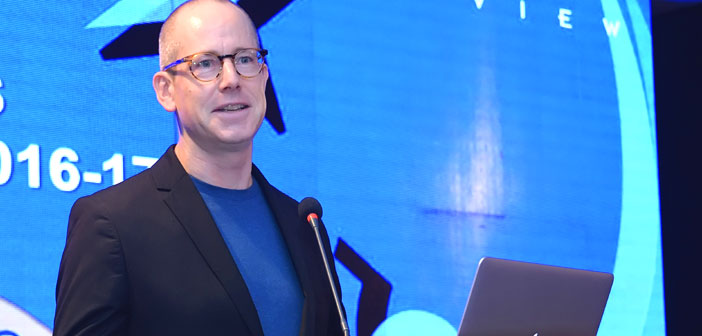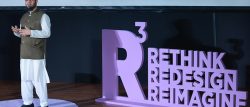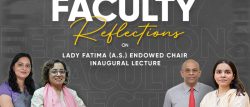Dr. Markus Heidingsfelder is currently an Assistant Professor of Communication & Design at Habib University. Having finished his doctoral degree in Literary and Media Studies and receiving formal honors from the Ludwig Maximilians-University Munich, as well as a Masters degree from University of Cologne, Dr. Markus has published many articles in peer-reviewed journals that focus on the relationship of communication and society, including an essay on pop music with one of Germany’s most respected theorists of communication, Professor Peter Fuchs.
In July 2018, he wrote a paper titled ‘Donald Trump and Alternative für Deutschland: The Crisis of Politics’ which has been published in the Journal of European Studies. The paper focuses on the idea that politics has lost its claim to make generally valid decisions for society. The paper interprets both Donald Trump and the Alternative für Deutschland (Alternative for Germany, in short: AfD) as solutions to that problem by understanding the votes of their supporters not as votes for a person or a party, but as votes against the political system itself. It tries to avoid the usual demonization of populist politics and persons and, instead, focuses on social functions and structures.
We got a chance to sit down with Dr. Markus and interview him about his most recent publication:
Z: Congratulations to your latest publication on Trump in the Journal of European Studies.
M: Thank you.
Z: Tell us about your paper! What was your motivation to do research on Donald Trump?
M: Well, you can’t escape him, can you? So far, the mass media controls the Trump discourse, and they do it by using moralistic distinctions, by demonizing him, and placing themselves on the other side as the ‘good guys’, and using this whole idea of the press as the fourth estate. I think it’s amazing that the Washington Post changed their slogan to ‘Democracy dies in darkness’ – this is clearly a Trump effect. But what they are actually saying is of course: We won’t let that happen, we’re here to shine a light, to ‘enlighten’ the world.
Z: But wait – so you agree to his thesis that they are organizing a ‘witch hunt’ against him?
M: (laughs) No, of course not. It’s not that simple. But he kind of has a point here. It’s a hunt for information and from the perspective of communication theory, information is anything that surprises you. Anything new. And he gives them that – another breaking of norms, another attack on a political opponents or on the press, another funny or mysterious tweet, more embarrassing behaviour – they’re complicit in this – also in making Trump bigger than he actually is. Especially as one of their main selection mechanisms is conflict, and as you know, Trump is a master of conflict ceremony. It is his favourite communication strategy for a number of reasons. But I think the biggest problem is the mass media’s interest in persons, in heroes and in villains. They overestimate the importance of individual actions. So that’s the deficit I tried to compensate – to point out the structures that are at the heart of all those conflicts. And by doing that, live up to our social responsibility as scientists.
Z: Which is?
M: I would say to ‘tell the truth’. Sounds pathetic, doesn’t it?
Z: Indeed!
M: Well, you have to take it with a grain of salt – it is not ‘the’ truth of course. But that’s our social monopoly – we have the license to distinguish between fake and real, between what is true and what isn’t. Which is why I find it amazing that the mass media try to claim this as their main function these days. And why do they do that? Because Trump says they’re spreading fake news. So again, they are just reacting to him, they’re playing his game. He calls them the enemy of the people, and what do they do? They create this strange kind of ‘functional movement’, led by the Boston Globe, appealing to the people: ‘Please listen to us, we are not your enemy!’
Z: I heard you already have a contract for a book on Trump. Is that fake news? And if it’s not, how does that relate to your article, will it be a part of it?
M: No, that’s actually true. The book looks systematically at Trump, relating the phenomenon to the different areas of society, like politics, economy, the law, the mass media, etc. Whereas the article compares Trump to the AfD (Alternative for Germany) –
Z: Which is this new German party.
M: Right. Dr. Tasneem, who is one of the editors of the Journal of European Studies asked me to contribute something to their latest issue of radicalization, so I kind of extended my Trump research and looked at this German equivalent. I consider both as a part of a bigger trend I call the crisis of politics.
Z: In one sentence, how do you define that crisis?
M: In one sentence: Politics has lost its claim to make generally valid decisions for the whole of society. Can I have two more please?
Z: Just two!
M: Well, normally the AfD or Trump or the right-wing movement in general are seen as problems. What I do is, I’m inverting this perspective. They are there for some reason, right? So I see them as solutions. They solve something. And my job is to construct this something, this problem.
Z: And this problem is the crisis of politics?
M: Yes, the mistrust on politics, the mistrust in the ‘political class’ if you like, in the political elite. From that perspective, the people didn’t vote so much for Trump or the AfD – they voted against politics, against that class.
Z: And what can we do about the rise of populism and right wing-ideology?
M: Well, I can only answer that as a researcher: we need to carefully observe these things- and offer our observations to society. I disagree with Marx, in that it’s not enough to simply describe things, that it is our job to change them. And even the Marxists don’t agree with me here, at least someone like Manuel Castells does.
Z: What is Castells saying?
M: Basically that trying to frame political practice with social theory is a dead end. That our task is to free people from uncritical adherence to ideology, that we should not tell them what to do, but offer them different interpretations of what is going on. That’s what I try to do with my Trump research – offer a different interpretation of the phenomenon.
Z: Thank you very much for this interview. And please keep us posted about your Trump research.
M: I will.
Z: One last question – do you think he will be impeached?
M: Absolutely no idea. So far it doesn’t look like it. But I’m not a prophet. The future is uncertain, that is its exact definition.
To read ‘Donal Trump and the Alternative fur Deutschland AfD: The Crisis of Politics’ by Dr. Markus Heidingsfelder, click on the given link: https://www.researchgate.net/publication/326683366_Donald_Trump_and_the_Alternative_fur_Deutschland_AfD_The_Crisis_of_Politics




